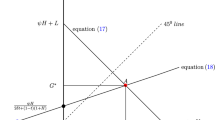Abstract
This paper offers an explanation why most democracies arecharacterized by moderate taxation of wealth although thewealth distribution is persistently skewed to the right. Wemodel an economy in which agents have to acquire highereducation to qualify for skilled work and in which capitalmarket imperfections prevent poor individuals from making sucha profitable human capital investment. If these borrowingconstraints do not bind for members of the middle class, theymay rationally reject redistribution although both the currentand the future median of the wealth distribution are below themean.
Similar content being viewed by others
References
Aghion, P., Banerjee, A.V. and Piketty, T. (1999). Dualism and macroeconomic volatility. The Quarterly Journal of Economics 114: 1359–1397.
Banerjee, A.V. and Newman, A.F. (1993). Occupational choice and the process of development. Journal of Political Economy 101: 272–298.
Becker, G.S. (1991). A treatise on the family. Cambridge: Harvard University Press.
Benabou, R. (1996). Inequality and growth. NBER Macroeconomics Annual 11, 11–74. Cambridge: MIT Press.
Benabou, R. and Ok, E.A. (2001). Social mobility and the demand for redistribution: The poum hypothesis. The Quarterly Journal of Economics 116: 447–487.
Breyer, F. and Ursprung, H.W. (1998). Are the rich too rich to be expropriated? Economic power and the feasibility of constitutional limits to redistribution, Public Choice 94: 135–156.
Galor, O. and Zeira, J. (1993). Income distribution and macroeconomics. Review of Economic Studies 60: 35–52.
Harms, P. and Zink, S. (2002). Limits to redistribution – a survey. unpublished manuscript.
Hindriks, J. (2001). Is there a demand for income tax progressivity? Economics Letters 73: 43–50.
Matsuyama, K. (2000). Endogenous inequality, Review of Economic Studies 67: 743–759.
Owen, A.L. and Weil, D.N. (1998). Intergenerational earnings mobility, inequality and growth, Journal of Monetary Economics 41: 71–104.
Piketty, T. (2000). Theories of persistent inequality and intergenerational mobility. In A.B. Atkinson and F. Bourguignon (Eds.), Handbook of income distribution, 429–476. Amsterdam: Elsevier.
Putterman, L. (1997). Why have the rabble not redistributed the wealth? On the stability of democracy and unequal property. In J. E. Roemer (Ed.), Property relations, incentives and welfare, 359–389. IEA Conference 115.
Author information
Authors and Affiliations
Rights and permissions
About this article
Cite this article
Harms, P., Zink, S. Eating the Rich vs. Feeding the Poor: Borrowing Constraints and the Reluctance to Redistribute. Public Choice 116, 351–366 (2003). https://doi.org/10.1023/A:1024862825446
Issue Date:
DOI: https://doi.org/10.1023/A:1024862825446




